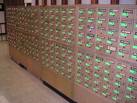 n (seems an accurate description~just as i'm about to live up to my title as well as the ire of my sun sign) over a month ago (must have been somewhere around October 25 to be more exact), pondered it then, and have been meaning to write about it ever since, but you know how life kind of rolls along, rolls over you, you're rolling, and things happen and before you know it… (well, i don’t really know) but here it is:
n (seems an accurate description~just as i'm about to live up to my title as well as the ire of my sun sign) over a month ago (must have been somewhere around October 25 to be more exact), pondered it then, and have been meaning to write about it ever since, but you know how life kind of rolls along, rolls over you, you're rolling, and things happen and before you know it… (well, i don’t really know) but here it is:We librarians, ever insecure about our status as "real" professional workers, tend to be the first to leap on any technological bandwagon that gets rolling. In this regard, we have ended to be at the forefront of any mass intoxication with technology. Indeed, the lag time between development of the hypertext transfer protocol and the appearance of web-enabled computers in public libraries was notably short -- the HTTP and HTML specifications appeared only in 1991, and by 1993 computers with web connections were beginning to appear in public libraries.
We are to be commended (but grudgingly, for my part) for the eagerness and aplomb with which we embrace new information technology and plow right into the unbroken technical sod. (Not that it has done our public image one bit of good -- we could have invented the web and we would still be popularly seen as grumpy, uptight, persnickety old church ladies with hair gathered in a bun.)
(And why didn't we invent the web?)
We are also to be commended for our professional focus on serving library patrons in particularly "high touch" ways.
And yet we tend to deploy new technology in libraries without regard to patron wishes. We simply bull ahead. We don't ask permission. We assume we know what is best for our patrons. We don't learn from patrons' daily struggles with machines and interfaces.It is a tremendous hole in our profession.
Nothing so precisely illustrates the point as our trashing of our card catalogs. When Nicholson Baker complained about it in his article in The New Yorker, librarians did indeed protest too much.
Card catalogs demanded just two things -- an ability to read and an ability to flip cards with fingers. You didn't have to understand graphical user interfaces or how to operate a mouse. You didn't have to stand there and wait on a slow network. At the worst, someone might have hogged the drawer you needed for a few minutes, as opposed to nowadays when you lose access for days when the library's server crashes.
Nobody asked our patrons about the change. And we made two assumptions -- that everyone understands how to operate a computer, and that everyone would welcome the change from card to online catalogs. As anyone who still works a public desk can attest, the first assumption is patently false. And the earful I get everyday from patrons about the user-hostility of our online catalog suggests that the secondassumption is false, too.
Mostly, though, the card catalog was something constructed on a human scale. Somewhere in the library, human beings created it and maintained it, relying only on the cataloging rules instead of the jabberwocky of computer science. The card catalog was a triumphantly physical object and cultural artifact, existing on the paper and in the oak in front of you, reliable, permanent (or so it seemed), and authoritative. It abided and it would not vanish into the ether the moment someone tripped over a power cord.
We have made second-class citizens of both those who cannot use information technology and those who refuse to use it. I'm reminded of a long-ago cartoon by Koren in The New Yorker, in which a poor fellow has been brought before the bench by bailiffs, one of which is informing the judge that the prisoner has been charged with "expressing contempt for data processing."
It may be cost-prohibitive to junk online catalogs at this point (though far greater resistance would come from librarians who long ago went over to the Dark Side than from city financial auditors), but a lesson we might take from the current sorry state of affairs is that we might ask our patrons about technology before we deploy it.
And would it be too much to ask that when the time comes to upgrade or change existing online systems, we first consider what we have been observing over the years as our patrons have struggled to use those systems? And redesign them in light of what we may learn?
 w to use computers, you either look things up for them and help them find them (like librarians always did with card catalogs); or help them do it themselves; or teach them how (isn't bibliographic instruction part of our PROFESSIONAL job description (it is mine)? (and where would we put card catalogs if we had them) and by the by we do do patron surveys and often incorporate the results into what we do in OUR system.
w to use computers, you either look things up for them and help them find them (like librarians always did with card catalogs); or help them do it themselves; or teach them how (isn't bibliographic instruction part of our PROFESSIONAL job description (it is mine)? (and where would we put card catalogs if we had them) and by the by we do do patron surveys and often incorporate the results into what we do in OUR system.
No comments:
Post a Comment